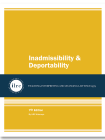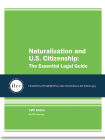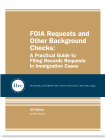Alison Kamhi is the Legal Program Director based in San Francisco. Alison is a dedicated immigrant advocate who brings significant experience in immigration law to the ILRC. Alison leads the ILRC's Immigrant Survivors Team and conducts frequent in-person and webinar trainings on naturalization and citizenship, family-based immigration, U visas, and FOIA requests. She also provides technical assistance through the ILRC's Attorney of the Day program on a wide range of immigration issues, including immigration options for youth, consequences of criminal convictions for immigration purposes, removal defense strategy, and eligibility for immigration relief, including family-based immigration, U visas, VAWA, DACA, cancellation of removal, asylum, and naturalization.
She has co-authored a number of publications, including The U Visa: Obtaining Status for Immigrant Victims of Crimes (ILRC); FOIA Requests and Other Background Checks (ILRC); Naturalization and U.S. Citizenship (ILRC); Hardship in Immigration Law (ILRC); Parole in Immigration Law (ILRC); Special Immigrant Juvenile Status and Other Immigration Options for Children and Youth (ILRC); A Guide for Immigrant Advocates (ILRC); and Most In Need But Least Served: Legal and Practical Barriers to Special Immigrant Juvenile Status for Federally Detained Minors, 50 Fam. Ct. Rev. 4 (2012).
Alison facilitates the eight member Collaborative Resources for Immigrant Services on the Peninsula (CRISP) collaborative in San Mateo County to provide immigration services to low-income immigrants in Silicon Valley.
Prior to the ILRC, Alison worked as a Clinical Teaching Fellow at the Stanford Law School Immigrants' Rights Clinic, where she supervised removal defense cases and immigrants' rights advocacy projects. Before Stanford, she represented abandoned and abused immigrant youth as a Skadden Fellow at Bay Area Legal Aid and at Catholic Charities Community Services in New York. While in law school, Alison worked at the United Nations High Commissioner for Refugees (UNHCR), the ACLU Immigrants' Rights Project, and Greater Boston Legal Services Immigration Unit. After law school, she clerked for the Honorable Julia Gibbons in the U.S. Court of Appeals for the Sixth Circuit.
Alison received her J.D. from Harvard Law School and her B.A. from Stanford University. Alison is admitted to the bar in California and New York. She speaks German and Spanish.




